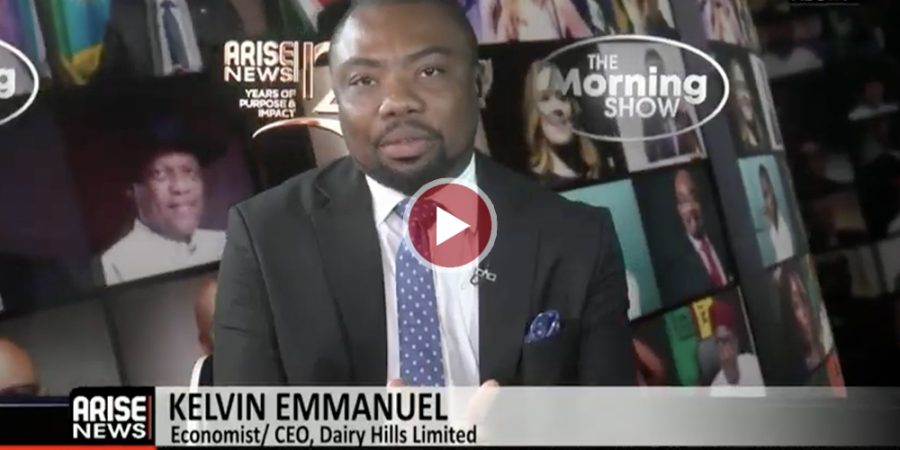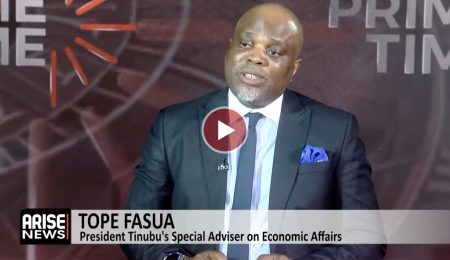Economist Kelvin Emmanuel has said that while Nigeria’s upcoming GDP rebasing is expected to significantly increase the country’s economic size on paper, it may not reflect the harsh realities faced by most Nigerians.
Speaking in an exclusive interview with ARISE News on Sunday ahead of the July 11 announcement, Emmanuel explained that the rebasing, which will shift Nigeria’s GDP baseline to 2019, is meant to better capture current economic conditions. However, he warned that recalculating the GDP without addressing declining living standards risks creating the illusion of growth without real improvement.
“GDP basically is, you know, a sum total of goods and services, you know, when you calculate it at the current prices, and the nominal GDP is a sum total, the real GDP is adjusted for inflation. And what they basically do is move forward the base year to account for current realities in the markets,” Emmanuel said.
“And if you look at the history of GDP rebasing in Nigeria, you see that within the last 50 years, Nigeria, the first GDP rebasing was done in 1975, and Nigeria’s GDP was rebased to $27 billion. The second GDP rebasing was done in 2014, and they used the base year of 2010, and it was rebased to $574 billion. And then now the next GDP rebasing that is being done, we’re using 2019 as the calendar year because, you know, they felt like 2019 was a year before COVID, it was the most stable Nigeria had experienced in the last, I’ll say, nine to 10 years.”
“You know, there’s projection that GDP is going to rise from $188 billion where it’s currently at, to anywhere around maybe $375 or $385 billion. Those are the projections. And when you adjust it for inflation, it might go up to anywhere around maybe $585, $587 billion, you know.”
“But the reason why GDP rebasing is important is because, number one, when you rebase the GDP, you’ll be able to get metrics like GDP per capita. So GDP per capita is basically your GDP divided by the population of the country. So if you divide GDP of Nigeria, for example, currently by the population, you get GDP per capita.”
“And what that does, it helps business people and investors to understand, you know, when they say there’s a gap in the market, the next question they ask is, is there a market in that gap? Do the people actually have the spending power, the purchasing power, the purchasing power parity when you compare for the exchange rate differences, you know, to be able to accommodate for goods and services in an economy?”
Expanding on the various drivers of GDP growth, Emmanuel said: “If you look at the drivers of GDP, for example, GDP growth, you have consumer spending, you have investments, domestic investments, you have foreign investment, FPIs, FDIs, FPIs, which is where foreign portfolio investments are what you call the hot money, which typically doesn’t stay for more than 18 months to 24 months. Then FDIs are more patient and slow capital that stays for a longer period of time. Those are the ones that have boots on the ground, you know. Then you have government spending.”
“You know, government spending talks about how much of the budget is performing and how much of that budget actually goes into the real economy. Then you have balance of trade, which is the difference between your import and exports. So when you look at these different GDP drivers, the question you are going to ask yourself is, how do you account for consumer spending over the last six years, considering that per capita income dropped from $2,100 in 2019 to about $835 today, GDP per capita in Nigeria?”
“You know, how do you account for investments? FPIs, you’ve seen FPIs going and come out of Nigeria, but that’s the reason why you’ve seen the Naira, you know, not appreciated so far, even if the dollar index has been dropping significantly and the Naira is not responding to the global drop in the U.S. dollar index. How do you account for government spending, given that the government has missed its revenue estimates significantly and has had to, the National Assembly has had to, you know, modify the capital expenditure implementation window from June 2025 to December 2025?”
“There’s been improvement in balance of trade, you know, Nigeria is exporting more because of the exchange rate and stability in the FX markets, you know, but all of these metrics are what drives GDP growth and GDP rebasing, like I said, is basically just moving the accounting year to account for the sum total of goods and services at current prices.”
However, Emmanuel raised concerns about the disconnect between GDP figures and the lived experiences of Nigerians. “You can’t have a strong economy when per capita income has fallen below $900 and people are struggling to survive,” he said.
He further remarked: “I think that in the last five to six years, I’ve practically seen the middle class in Nigeria almost disappear. It’s either you’re rich or poor in Nigeria. The poverty rate has gone up. People are barely able to even eat food.”
Addressing the challenges of capturing accurate data, Emmanuel acknowledged: “Data is a major challenge in Nigeria.” He expressed skepticism about the accuracy of official inflation figures. “I find it very funny… because that was what, you know, brought down significantly the inflation rate, which the CBN, for example, has not responded to because they don’t believe those figures.”
He also stressed the need for better transparency and revenue mobilisation, particularly in the oil and customs sectors. “The government must address the under-declaration of revenues from customs and oil,” he said, suggesting this would improve capital formation and help grow the economy in a sustainable way.
On the implications of the rebasing, Emmanuel said: “I anticipate the NBS will highlight significant contributions from the refining sector, particularly from Dangote’s operations. I expect that NBS will say that, you know, refining has been the most important factor for 2024 for the Nigerian economy.”
But he remained sceptical about whether any statistical improvements will be felt by ordinary citizens. “Inflation is coming down on paper, but food prices in Lagos are skyrocketing,” he pointed out, urging the government to release a National Living Standards Survey to provide a clearer picture of Nigerians’ actual conditions. “What is the National Living Standards Survey saying about the quality of life of Nigerians?”
Emmanuel concluded with a blunt warning to policymakers: “The reality is that many Nigerians cannot afford food. This is not just a statistic; it reflects a deeper crisis that needs to be addressed. If the government doesn’t address these issues, the legacy of this administration will be one of neglect.”
As Nigeria prepares to unveil its new GDP figures, the challenge remains how to ensure that economic growth on paper translates into real improvements in the daily lives of Nigerians.
Boluwatife Enome
Follow us on:


